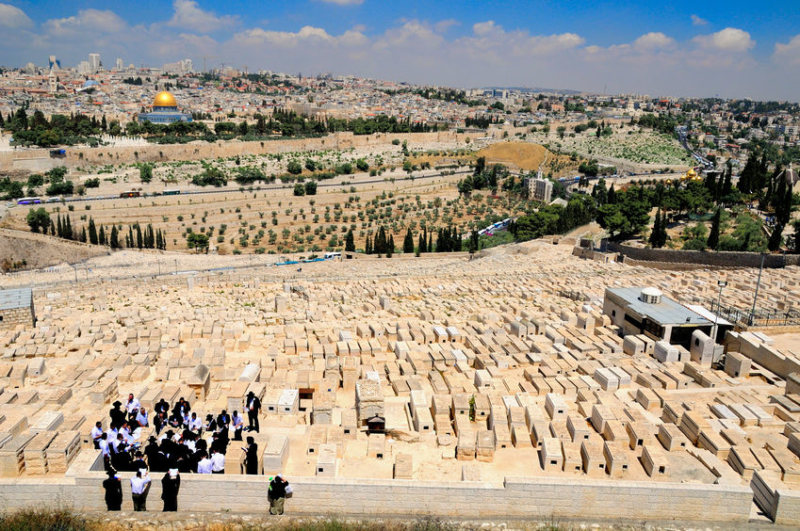By Elizabeth Bryant | Religion News Service March 12, 2014
PARIS — Franck Darmon is only 35, but he already knows where his bones will lie. Not in his native France,but in Israel.
“When you compare a cemetery in Israel — with the blue sky, the sun and all the white tombstones — to a cemetery in France with the gray surroundings, it’s very
distressing,” Darmon said. “The soul doesn’t have the same type of rest.” Darmon is not the only French Jew reaching this conclusion, and not just because of the weather. France may have Europe’s largest Jewish population, but many don’t want to stay here for eternity. For the living and the dead, Israel is increasingly becoming the final destination. Some are snapping up cemetery plots in the Holy Land early on, as insurance against premature death and sharply rising prices. Others are unearthing loved ones from French graveyards for reburial in Israel, sometimes decades after their burial. Their decisions are being shaped by a confluence of religious, emotional and historical considerations. But one of the most powerful is also practical; Jewish-only plots in some French cemeteries — along with their leases — are rapidly running out. Darmon, who manages a funeral home in northeastern Paris, is seeing the change on his ledgers. Roughly a third of all his business now ends up in Israel. “Many others would like to be buried there but don’t have the money,” he said. “In Paris, I’d say the majority of Jews want to be buried in Israel.” The shift mirrors a larger uptick in French immigration to Israel, although the scale is far more modest when it comes to the dead. The exact number of French burials in Israel is difficult to establish. Israel’s El Al Airlines, the main transporter of Jewish coffins from France, would not release numbers. But undertakers estimate a few hundred caskets head to the Holy Land yearly, compared with the housands of French Jews making aliyah, or immigrating to Israel. “It’s not exponential, it’s a steady growth” of about 10 percent in the past decade, said a spokeswoman for the Consistory of Paris, which represents Jewish communities in the city. “More French Jews are immigrating to Israel, so they’re being buried there as well,” said the spokeswoman, who asked not to be identified. There’s also a return to religion, and being buried in the Holy Land is immensely significant religiously.” For Ariel Kandel, who heads the Paris office of the Jewish Agency for Israel, it makes more sense for Jews to head to Israel alive. “The point of Israel isn’t to get buried there, but to live there and to build a country,” he said. But increasingly, burial decisions are driven by necessity as much as by choice. Many cemeteries in France still have plenty of space. That includes private, Jewish-only graveyards in the Alsace and Moselle regions, which have a separate statute from other parts of France for historical reasons. But in the Paris area — where roughly 70 percent of the Jewish community lives — Jewish-only sections of graveyards are running out of room. That’s as much the case for the elegant 19th-century Montparnasse cemetery in Paris, where the iconic Jewish military officer Alfred Dreyfus is buried, as for the sprawling graveyard in the working-class suburb of Pantin, which is one of the area’s largest. “Cemeteries like Pantin are now beginning to have mixed plots,” said Darmon, the undertaker. “So those who are scrupulous about being buried in a Jewish-only cemetery prefer to be buried in Israel.” France’s majority Sephardic community has been hit with another shock. Many bought burial plots after arriving from North Africa half a century ago, assuming they were for infinity. Now, they are discovering the allotments holding family members have fixed-term concessions that are rapidly expiring.
In 2011, France passed new legislation allowing authorities to exhume and burn remains of expired and untended graves — a practice that goes against Jewish customs.
“People are very scared about the future of their family members. They realize burial is not a lifetime, it can mean being thrown out one day, “ said Mendel Azimov, a prominent Lubavitcher rabbi in Paris. “So every day, there are dead people sent to Israel.”
Funeral homes are quickly responding to this new reality. A glossy brochure at Darmon’s funeral home boasts pictures of tombs perched over Jerusalem and promises of “the Mount of Olives for everyone.” Across town, Sportes Funeral Home has bought up 100 plots at the Beit Shemesh cemetery southwest of Jerusalem and has contacts with others to ensure speedy
burial.
“People are buying plots now because the prices in Israel are soaring,” said undertaker Menahem Perez, whose funeral home sends about 130 caskets yearly to Israel. Perez has also received training for exhuming bodies according to Jewish law, for reburial there. “It’s about 2,000 euros more to be buried in Israel, and it’s worth it,” he said. “Because Israel is forever.”
Less red tape and easier access — El Al now has daily flights from Paris — help sell the idea. “Ten years ago, it took three days to repatriate bodies to Israel,” Perez said. “Now, we can have a death in the afternoon, and the body is on the plane that evening.” Minutes later, Perez is in his car, driving to his latest appointment on a bleak afternoon. At a hospital outside Paris, family and friends crowd around a casket set out in a small room. Men chant passages in Hebrew. An old woman sobs quietly in a corner. A policeman seals the coffin before it is lowered into a waiting van. The door snaps shut, and the body is gone, on its way to Israel and sunshine.
Copyright: For copyright information, please check withthe distributor of this item, Religion News Service LLC.





Laisser un commentaire